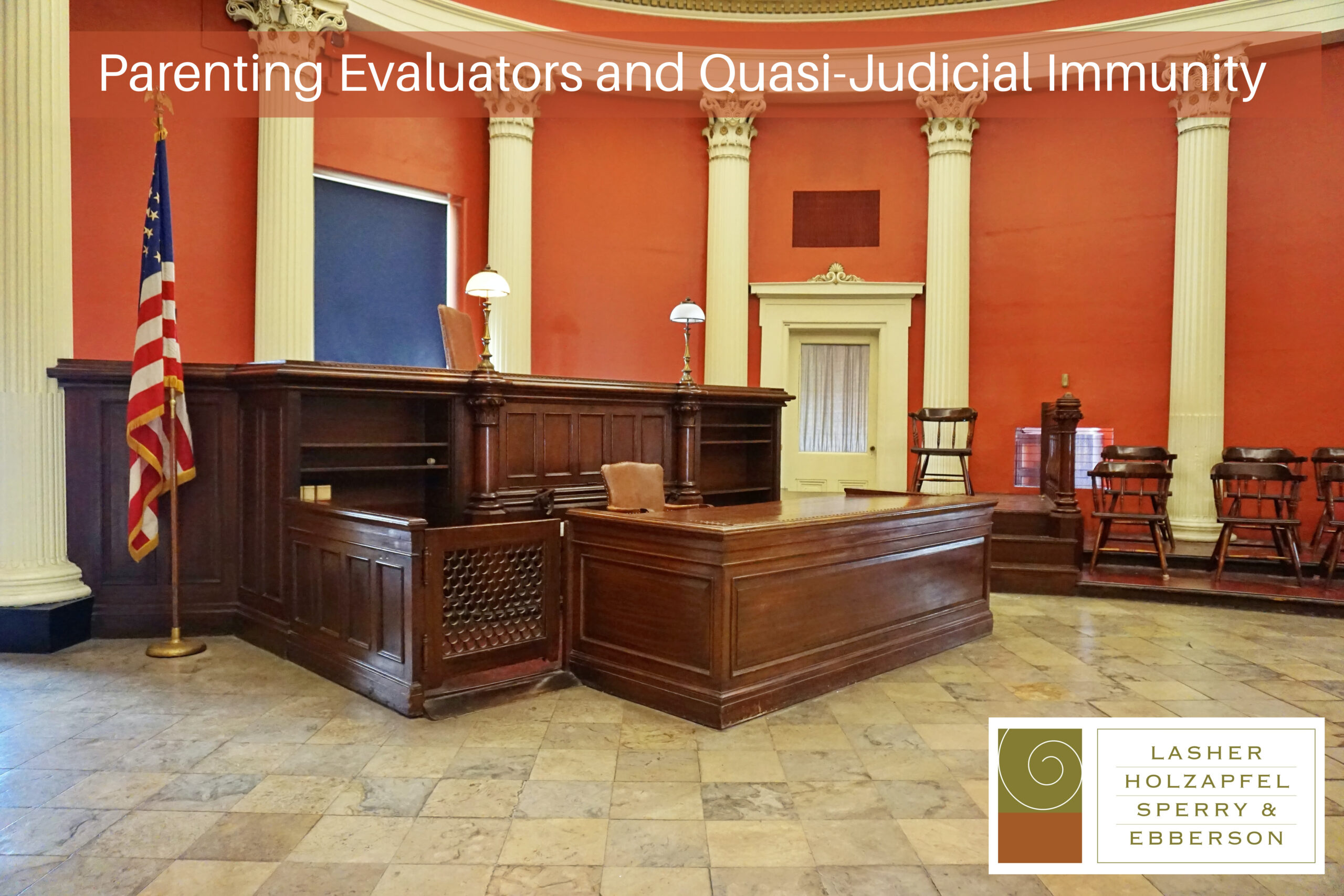Parenting Evaluators and Quasi-Judicial Immunity

Posted on March 6, 2023 by Will Reingold
When custody arrangements are in dispute and the parties cannot agree on a parenting plan, the trial court may order that a “parenting evaluator” be assigned to the case. The evaluator acts as a neutral, third-party who provides a report to the court assessing the family and offering recommendations as to what is in the children’s best interest. To do this, the parenting evaluator may: (1) interview the parents, the children, and/or collateral witnesses; (2) observe the children interact with each parent individually; and (3) review all relevant records and communications regarding the children and/or the parties’ ability to parent. In certain instances, the Court may ask the parenting evaluator to investigate issues relating to one parent’s criminal history, mental health issues, incidents of domestic violence, and/or other matters. The report may also address any concerns one parent may have about the other—e.g., an issue that may impair the other’s ability to parent, the evaluator may explore this claim in rendering a report. Ultimately, the evaluator should explain the evaluator’s reasoning for the recommendations being made to the court.
Some parents ask whether there is any recourse if there is dissatisfaction with the evaluator’s report. First, understand that the evaluator’s report is not dispositive on the outcome of the case. The judge overseeing the case still needs to rule on the matter, and the report is meant to assist the judge. Indeed, it has been said that “the court may not abdicate its ultimate authority” by merely regurgitating what a third-party posits to be in the child’s best interest.[1] While judges are entrusted to know the law, they may not know the complexities of child psychology. Parenting evaluators typically are psychologists with advanced degrees on the subject, and because of this, judges often heed their learned recommendations. Moreover, parenting evaluators are shielded from a disaffected parent’s criticism to the extent they have what is known as “quasi-judicial immunity.” This type of immunity attaches to persons who perform functions deemed so comparable to those performed by judges that it is felt they should share the judge’s absolute immunity while carrying out those functions. As a matter of policy, quasi-judicial immunity exists “for the protection of the public, and to ensure active and independent action by individuals charged with fashioning judicial determinations.”[2] The case of Reddy v. Karr established that quasi-judicial immunity attaches to family court evaluators because they act as an arm of the court, eloquently setting forth the onerous realities of ascertaining the child’s best interest:
“Courts have the grave obligation to serve the best interests of minor children of divorcing parents with respect to where the child shall primarily reside and other issues of great importance to the child, its parents and society as a whole. Courts do not ordinarily perform independent investigations; rather the adversary system of justice ordinarily requires that parties to litigation investigate and present evidence from which the court finds facts and applies legal principles in order to resolve controversies. But the unique obligation of courts to serve the best interests of minor children in cases of divorce often requires independent investigations of allegations between warring parents, professional evaluation of parenting abilities, determination of the degree of bonding between children and each parent—not to mention the wisdom of Solomon when the most expedient solution might appear to be to “saw the baby in half.” Judges cannot personally perform these independent investigations and evaluations, due not only to the volume of cases but also to the impropriety of ex parte contact between judges, parties and witnesses. Accordingly, a surrogate is necessary. Family court investigators and evaluators performing court-ordered services do so as surrogates for the court.”[3]
All of this is as academic as it is interesting. Some ask what can be done for the parent that wants a glossier recommendation or to pursue legal recourse against the evaluator. The simple answer is not much. Immunity from suit “is not merely a defense to liability but an entitlement not to stand trial or face the other burdens of litigation.”[4] One very recent case concerned a parent who sued the parenting evaluator for a bevy of claims, including breach of contract, malpractice, negligent infliction of emotional distress, and breach of fiduciary duties; the case was summarily dismissed.[5]
With the parenting evaluator’s role being so important and subject to impunity, preparation for a parent meeting with an evaluator is essential. We have written on the topic here. The family law attorneys at Lasher Holzapfel Sperry & Ebberson are available for individualized assistance.
[1] Kirshenbaum v. Kirshenbaum, 929 P.2d 1204, 1207 (Wash. Ct. App. 1997).
[2] Reddy v. Karr, 9 P.3d 927, 930 (Wash. Ct. App. 2000).
[3] Id. at 930–31.
[4] Janaszak v. State, 297 P.3d 723, 729 (Wash. Ct. App. 2013).
[5] Prassé v. Milner, No. 83920-9-I (Wash. Ct. App. 2023) (unpublished).

